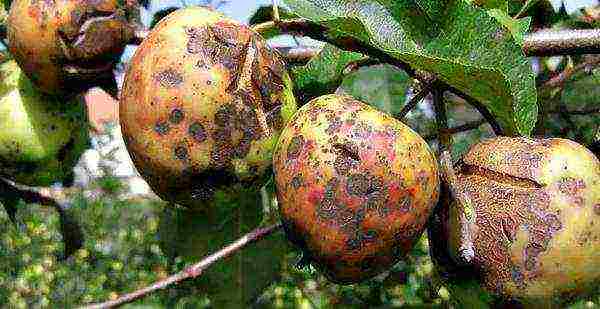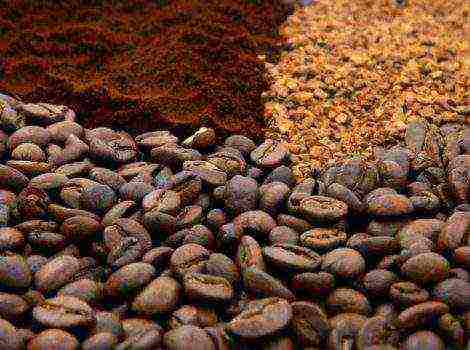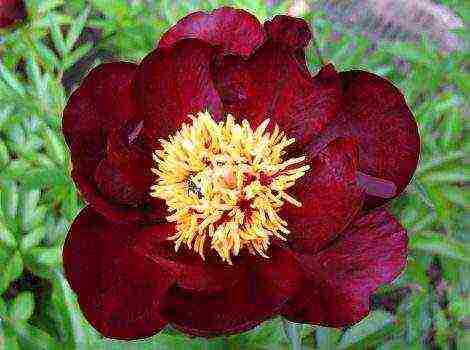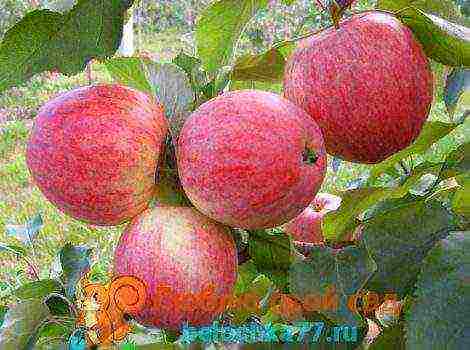Content [show]
Belarusian varieties are ubiquitous, as the tubers have an excellent presentation, and the taste properties of the potatoes are at a high level. Potatoes bred in Belarus also grow well in Russia and Ukraine.
Belarusian potato varieties
Since Belarus itself divided into three climatic zones, then the varieties were developed specifically for each zone, so that the tubers gave the planned yield. In this country, potatoes are the second most important bread.
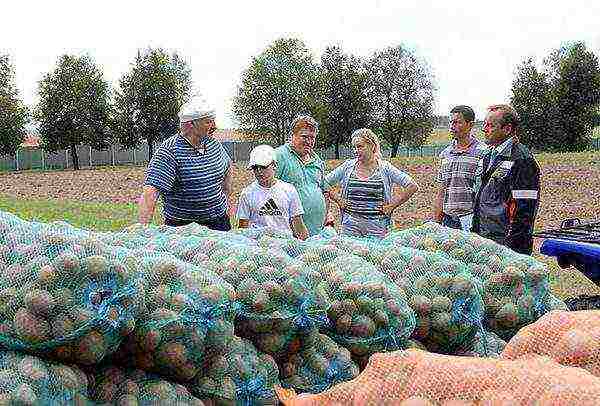 Everyone knows the important role of potatoes for Belarus
Everyone knows the important role of potatoes for Belarus
And therefore, the development of new varieties that give stable large yields is treated with great interest.
Potato breeding in Belarus
Today the country ranks seventh in the world in potato cultivation and selection in the country does not stand still. New developments appear that meet all the requirements of global standards.
Before you start mass planting tests of each grade are carried out for 12 years and only then is the variety registered. At the moment, universal species are not being created - they are created for certain climatic zones capable of giving a large harvest on any soil.
The varieties are distinguished by their high taste. Now they are breeding potatoes capable of storing tubers for a fairly long time at a temperature of 3 degrees Celsius.
In Belarus, the type of local selection is quite well known. Zhuravinka is cultivated by every second farm. It has 18.5% starch, reddish skin and creamy pulp.
Harvested per hectare 640 c. Excellent nutritional properties and good disease resistance.
The fruit of the selection of Belarusian scientists is the Skarb variety - which in translation from the Belarusian language means “wealth”. This is not an accidental name, because the tubers themselves, when excavated, resemble gold ingots. The skin of the tuber is yellowish and round in shape.
Scarb for dining purposes with a starch content of 16.5%. When cooked, the tubers do not change their shade to a dark color. At the same time, it is remarkably preserved, and 645 centners are collected. from one hectare.
Scientists believe that Scarb can also be used as a natural admixture for soil in order to cleanse it of harmful components.
Breeders of the Belarusian Research Institute produced by Zorachka... This type is harvested up to 310 centners. from one hectare. The variety is round and large. The skin is yellowish, the pulp is the color of homemade butter.
Zorachka excellently resists disease, and remains dense until the end of winter.
Belarusian potato varieties
The Belarusian selected vegetable is popular not only in Belarus itself, but also in the states that are engaged in the cultivation of potatoes.
Among them:
- Scarb
- Breeze
- Uladar
- Manifesto
- Zhuravinka
- Bellarosa
- Impala
- Red Scarlet
These types are used in the preparation of various dishes... For production, they grow or acquire - Zdabytak, Atlant, Signum, Maximum.
In these varieties, the starch storage is too high and it is used to make:
- Starch.
- Alcohol.
- Syrup.
Belarusian potato varieties are good because they are subdivided into different agro-climatic areas for cultivation.
The best varieties for planting in Belarus
Now they choose species with a starch content in a fairly large proportion, as this answers requirements for culinary and industrial consumption... In correlation with the desired effect in the manufacturer's catalog, the species are divided into groups with different purposes.
There is also a range of varieties in terms of ripening time. But the most popular are medium and autumn ripening species due to the fact that they have a long storage period without effort.
Table 1... Mid-season species that mature in 105 days.
| Species name | Tubers | Pulp | Productivity, t / ha | Disease resistance |
| Dubrava | Yellow shade and rounded shape | Cream | 50,0 | To crayfish and scab |
| Krinitsa | Yellow and oval | Creamy | 49,8 | To cancer, scab and nematode |
| Volat | Yellow and oval | Cream | 62,4 | To cancer, scab and nematode |
table 2... Medium late species that mature in 115 days.
| Species name | Tubers | Pulp | Productivity, t / ha | Disease resistance |
| Zarnitsa | Light pink oval | Beige | 52,7 | High |
| Zdabytak | Red oval | White | 60,7 | High |
| Maximum | Yellowish oval | Cream | 56,8 | High |
Species that ripen in mid-autumn may be damaged by the first cold weather, and therefore varieties are cultivated only in the southern regions.
Benefits of Belarusian varieties
On the territory of the republic more than 100 species are cultivated varied in terms of growing potatoes. All types are zoned for different areas. The tests take a long time to understand how adaptable the potato will be when grown in a particular region.
Also, the tubers are bred in such a way that the food and commercial qualities are at the level of foreign selection. But unlike her, you do not need to do an annual renewal of the planting seed.
The fact that farmers do not need to regularly renew seed for planting significantly saves the budget of farms.
Planting potatoes do not require large fertilizers and large harvests of potatoes are harvested from the areas, having the qualities:
- Productivity.
- The evenness of tubers relative to the shape.
- Presentable appearance.
- Resistance to diseases inherent in nightshade plants.
- Excellent taste.
- Excellent preservation in winter.
The republic has a well-equipped technical station and elite knowledge of agronomists developing new types of potatoes. Moreover, the obtained seed material sells well, since sales to various countries have long been established.
A lot of elite seed material for sowing potatoes is produced in the republic, which is sold after approbation by a state inspector who monitors the quality of the material. All this has been going on for over 100 years.
Features of planting and care
To help out a large harvest annually from a personal plot, first of all, you need to acquire healthy seed material that matches the species.
Before planting, seed potatoes are germinated for 20 days at a temperature of 13 degrees Celsius.
The rest cultivation agrotechnology does not differ and includes:
- Weeding;
- Watering;
- Loosening;
- Fertilizers;
- Treatments for the Colorado potato beetle and viral diseases.
At the same time, the soil for a large potato crop should also be light and fertile.
Competently approach the cultivation of potatoes, creating the necessary conditions - this will be the necessary options for obtaining a good high-quality crop.
Early varieties of potatoes of Belarusian selection
Uladar
Allocated for food use, a bush 50 cm high and spreading with refined stems.
 Uladar
Uladar
Table 3... Peculiarities of the Uladar variety.
| Index | Description |
| Skin | Yellow and smooth. |
| Eyes | Small and rarely located on the surface of the tuber. |
| Pulp | Creamy shade. |
| Form | Oval and large size, up to 12 pcs. in the bush. |
| Starch | 17%. |
| Flowers | Red-violet. |
Shows resistance to numerous diseases of nightshade plants.
Productivity per hectare - 424 tons.
Axamit
Designed for the manufacture of various dishes, moderately productive and short shelf life.
In order to preserve the crop of the popular Axamit variety in the room where the potatoes are stored, the temperature should not rise above 2 degrees Celsius.
Table 4... Features of the Aksamit litter.
| Index | Description |
| Skin | Yellow tint. |
| Eyes | Small ones. |
| Pulp | Pure white without admixtures of other shades. |
| Form | Oval, large tubers up to 12 pcs. in the bush. |
| Starch | 16%. |
| Flowers | White shade. |
Suitable for digging young potatoes.
The best mid-season and mid-late varieties
Between these types are highlighted:
Lasunok
The capacity of starch in the potato is increased, which gives confidence that the mashed potatoes made from it will be lump-free.
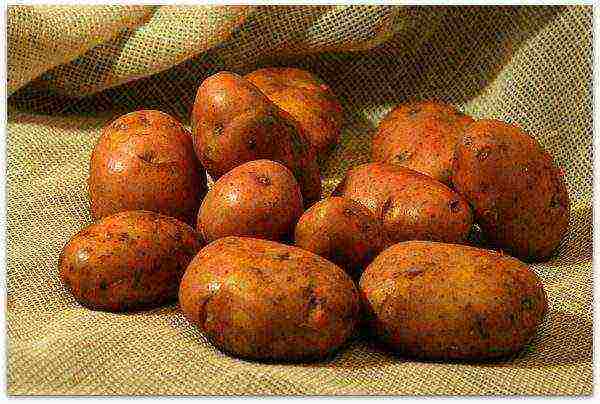 Lasunok
Lasunok
Table 5... Features of the Lasunok variety.
| Index | Description |
| Skin | A yellow shade with a rough mesh on the surface. |
| Eyes | Average. |
| Pulp | Creamy creamy shade. |
| Form | Sufficiently large and oval. |
| Starch | 20% |
| Flowers | White shade. |
Lasunka has remarkable resistance to diseases of nightshade plants - cancer, late blight of tubers, scab and viruses. The shelf life is only 4 months, provided that the temperature at the storage location is from –1 to +2 degrees.
When feeding planted potatoes do not get carried away with nitrogen fertilizers, otherwise the tops will grow too much and this will reduce the yield of potato tubers.
Crane
With good taste, it practically does not boil over. These potatoes are good for making chips.
 Crane
Crane
Table 6... Features of the variety Zhuravushka.
| Index | Description |
| Skin | Red tint, smooth to the touch. |
| Eyes | Small ones. |
| Pulp | Light yellow shade. |
| Form | Oval and medium in size. |
| Starch | 19,5%. |
| Flowers | Red-violet hue. |
The crane resists cancer and nematodes, scab and black leg, late blight and viruses. A lot of potatoes grow in one bush and therefore a good harvest grows.
View responsive to nitrogen fertilizers... Excellent keeping quality, tubers with good storage can be stored until the next harvest. When cultivated, it requires watering.
Yanka
For dining purposes, with a long shelf life and good taste.
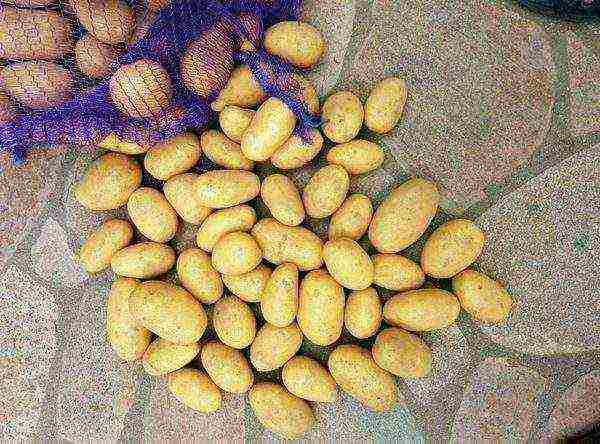 Yanka
Yanka
Table 7... Features of the Yanka variety.
| Index | Description |
| Skin | Yellow, slightly reticulate. |
| Eyes | Not deep. |
| Pulp | Cream shade. |
| Form | Oval tubers up to 12 pcs. in the bush. |
| Starch | 12-17%. |
| Flowers | White shade. |
Well resists potato diseases such as golden nematode, cancer, scab, late blight.
Resistant to mechanical damage and a shelf life of 95 days, and therefore can be planted for commercial purposes.
Which Belarusian varieties are the best sellers in Russia
Everyone decides for himself what to plant in his personal garden, but before giving preference to which variety, it is worth familiarizing yourself with the main indicators.
Manifesto
A mid-early type of Belarusian selection with great food flavoring properties. Tubers with a starch content of 15%, the skin is reddish and the flesh is creamy.
The yield is due to different conditions, but under normal conditions it forms 71 t ha. Stored for a long time, at a storage temperature of 4 ° C.
The species has developed resistance to diseases and the Manifesto is cultivated in the black earth.
Zdabytak Belarusian selection
Late technical type of potato containing starch above the norm. Forms a yield of up to 61 t ha. Zdabytka tubers boil well.
It is valued for a high percentage of starch, reaching 27%, but requires watering during cultivation.
Uladar
An early type of Belarusian selection. This potato can replace the advertised Scarb by properties... The tuber grows in the shape of a palm with a yellow skin, light yellow pulp, not deep eyes.
The starch content is 17%. Harvested in good years up to 72 t ha. Uladar resists most diseases.
A species adapted for cultivation on lands of different structure. Potatoes with excellent food flavoring qualities - for culinary dishes.
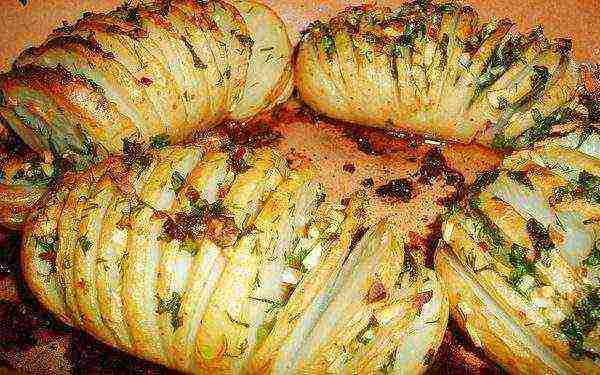 Potatoes are great for dishes around the world
Potatoes are great for dishes around the world
By giving preference to potatoes produced in the Republic of Belarus, you can be sure that in August-September we will dig out a harvest of high-quality potatoes. If at the same time adhere to the recommended agricultural techniques, then yields will be stable.
Potatoes, oddly enough, have always been one of the main vegetables in almost any dish. No first course is complete without potatoes. It is always an excellent side dish for meat or fish dishes, salads, so no festive table is complete without this vegetable.
Belarus has always been distinguished by a high harvest and a variety of potato varieties. Here, potatoes are second only to bread, therefore, a lot of attention is paid to the cultivation of this vegetable.
Characteristics of Belarusian potatoes
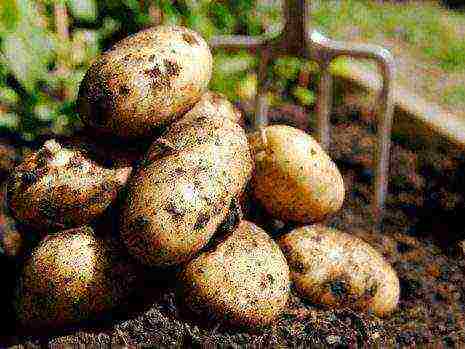
The territory of Belarus is divided into three climatic zones. Therefore, special varieties have been grown for each zone. So for the northern regions of the country, varieties of early maturity will be the best choice. This will allow harvesting before the weather conditions deteriorate, and will reduce the development of late blight. Belarusian potatoes are more adapted to the local soil and climate, therefore they are less susceptible to diseases in comparison with foreign potato varieties.
Thus, Belarusian agronomists have developed and continue to cultivate a large number of potato varieties. Belarusian varieties are distinguished by good softness, good taste and beautiful appearance of potatoes. In addition, they are famous for their high yields. Depending on the use, varieties of table potatoes were developed, intended for industrial processing, earlier varieties and varieties of long-term storage. According to early maturity, the following five varieties of Belarusian potatoes are distinguished:
- early - the term is 80-90 days
- medium early - ripening period is 90-100 days
- mid-season - ripening period is 100-110 days
- medium late - ripening period is 110-120 days
- late - ripening period is 120-130 days
Benefits of Belarusian potatoes
Based on the opinion and experience of breeders and professional agronomists, the Belarusian potato has a number of advantages, due to which it is very popular among other varieties.
- The favorable geographic location of the country has a beneficial effect on the soil and climatic conditions for growing potatoes.
- For many years, potatoes have been cultivated and processed in proven ways in accordance with the traditions of Belarusian agronomists and farmers.
- There is a good technical knowledge base of agronomists in the field of potato cultivation
- The supply of vegetable products to many countries of the world is well established.
Rules for choosing a potato variety for Belarus

In order to understand the principle of choosing a potato variety, you need to understand for what purposes it will be used. Most of the population grows potatoes on their plots for further consumption. But they can also be used in the future for processing in production, for early forcing or for long-term storage.
Table varieties differ not only in taste, but also in the degree of digestibility. So, for example, for frying, the majority choose less boiled varieties, and for mashed potatoes, more boiled ones.
An additional criterion is the potato ripening period and its frost resistance. Depending on the climate, many choose early varieties or frost-resistant ones.
It should be noted that there are varieties that are most suitable for the climate of the Republic of Belarus, all these varieties are included in a special State Register. All these varieties germinate very well on the Belarusian soil and give very good yields. The popularity of this root crop is very high, and potato planting in Belarus occupies more than 80% of all fields.
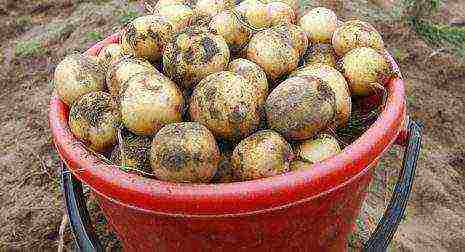
For those planning to sell this vegetable, market requirements should be considered when choosing a variety. But for those who grow varieties for themselves, you should choose varieties that are more resistant to various diseases.
In order to be sure of the ripening of potatoes, experienced agronomists plant several varieties of vegetables at the sites of enterprises. This is done in order to protect yourself from possible loss of the entire crop in the event of a bad year.
The most popular varieties of potatoes for planting in Belarus
Potato varieties that are grown in the Republic of Belarus are also widespread in other countries of the former CIS, because these varieties have not only an attractive presentation, but also grow well on the soil of these countries. It should be noted that the best potato varieties for growing in Belarus are bred in this republic.

The characteristics of all varieties and varieties can be divided according to taste, color, cultivation peculiarity. But the most popular classification is by ripening time. Thanks to this classification, it is possible to understand the timing of ripening and harvesting, and it is also possible to achieve multiple harvests from early summer to late autumn.
Early maturing varieties
The early varieties of Belarusian potatoes include Dolphin, Uladar, Lazurit.
Dolphin

This variety gives a very good yield. It is attractive in appearance, the skin is yellow and the flesh is white. There are 14 to 16 tubers in a bush. This variety is nematode resistant. One of the advantages of the Dolphin variety is its resistance to dry weather.
Uladar
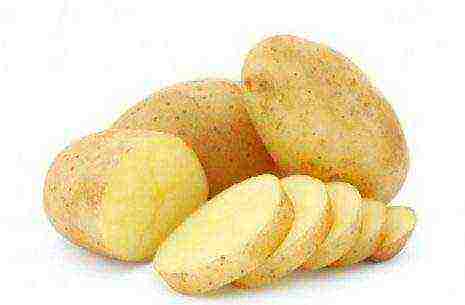
This variety is distinguished by its medium boil-over. Resistant to many diseases. After ripening in the bush, you can dig up from 9 to 12 small tubers. The peel is yellow, the flesh is creamy.
The variety is very tasty and very popular among gardeners.
Lapis lazuli
The tubers of this potato variety are large, the skin color is pronounced yellow, and the flesh is creamy. This variety gives a very early harvest, and therefore potatoes should be stored at rather low temperatures - 1-3 degrees.
Medium early varieties
A feature of these potato varieties is their ripening period, which is approximately 100 days. These varieties include "Lileya", "Yanka" and "Skarb".
Lileya
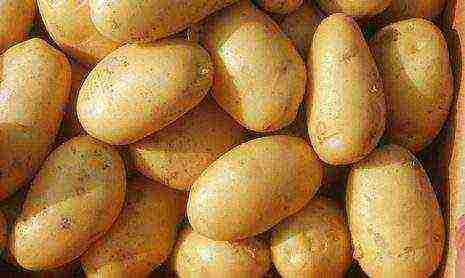
In appearance, it is a rounded potato with a light yellow center. The peculiarity of this variety is that it is suitable for freezing, as well as for cooking French fries.The variety is resistant to late blight.
Yanka

This variety gives high yields, tubers are quite large, and Yanka is unpretentious in care. From 8 to 12 tubers sprout under the bush. The color of the roots is yellow, the flesh is beige. This variety is resistant to drought and frost. With proper feeding, the yield can be increased several times.
Scarb
 You may be interested in:
You may be interested in:
This high-yielding variety has a very attractive presentation. The peel is smooth, the flesh is yellow. Good taste. There are about 15 small tubers in the bush. The variety "belongings" is a favorite type for cultivation not only in Belarus, but also in the former CIS countries, since this type of potato is unpretentious to the soil.
Mid-season varieties
The varieties of Belarusian potatoes that ripen in a period of 100 days include such as "Dubrava", "Krinitsa" and Volat ".
Dubrava

Good taste good. It has a very good keeping quality. Tubers are medium in size. Rounded shape, with small eyes. The pulp is creamy. This variety of Belarusian potatoes is popular among mid-season varieties due to its good yield and disease resistance.
Krinitsa

This variety has an average yield. There are 6 to 9 tubers in the bush. It is very well stored and has a regular rounded shape without obvious eyes. Of the shortcomings, susceptibility to late blight is often distinguished.
Volat
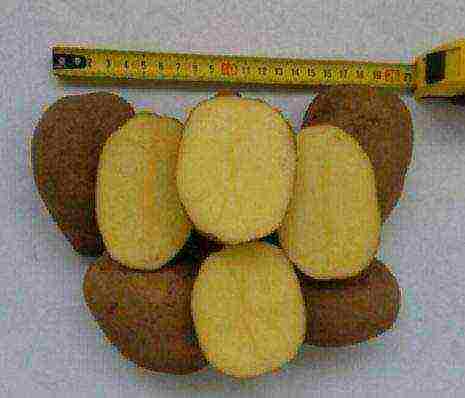
A large number of tubers, sometimes up to 15 pieces. The potatoes are delicious. The flesh and rind are yellow. Store well. This variety is distinguished by a large number of nutrients.
Mid-late varieties
Medium-late potato varieties are characterized by a ripening rate of 110-120 days. These include "Zarnitsa", "Zdabytak" and "Maximum".
Zarnitsa

The average size of pink tubers has a white flesh. There are about 16 tubers in the bush, which compensates for its size. A feature of this variety is that when cut, the pulp does not darken for a long time.
Zdabytak
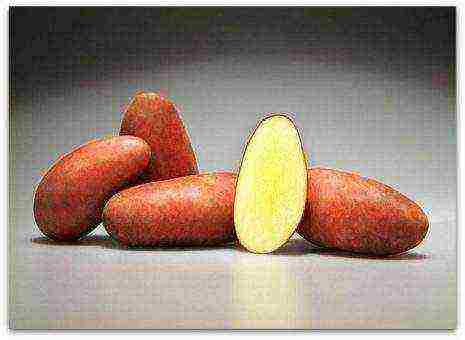
Very well cooked potato variety. The starch content is high. The skin is red and the flesh is white. This variety is considered both table and technical. This variety requires mandatory watering.
Maximum
This variety has a very good keeping quality. The fruits are medium in size. The pulp boils well. This variety has a high starch content, so it is often used for this very purpose. Resistant to most diseases, unpretentious in care.
Late-ripening varieties
Late Belarusian potatoes ripen in the period from 120 to 130 days from the beginning of their planting in the ground. These varieties include Vesnyanka and Rogneda.
Vesnyanka
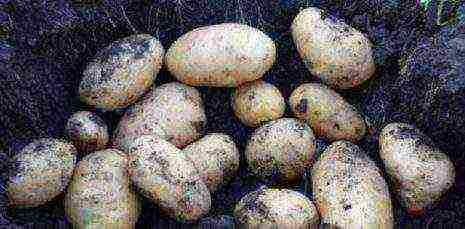
Smooth skin and even shape give this potato variety an attractive presentation. It shows itself well during storage. Pleasant taste. Resistant to most diseases.
Rogneda
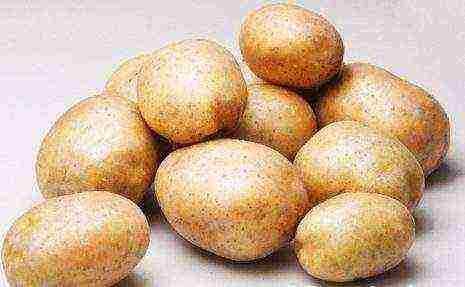
A large bush with large tubers. The color of the peel and pulp is yellow. The shape of the potato is oval. This variety is suitable for early digging without ripening potatoes. The dense skin allows these potatoes to keep well.
Rules for planting potatoes in Belarus
The potato planting period usually begins in the second half of April. Since even at the beginning of April, night frosts are possible. In this case, the ground can freeze by 5-10 cm, usually planted potatoes can be at this depth. In early April, only early potato varieties can be planted. But in this case, after planting, it is necessary to cover the areas with potatoes with film or spunbond so that frosts cannot damage the seedlings. The end of March can "please" with snow, so planting potatoes during this period is not yet recommended.
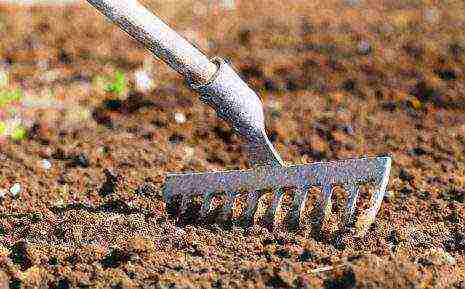
Important! The ideal conditions for planting potatoes will be when the soil temperature warms up to + 5C
The planting method plays an important role when planting potatoes. Typically, there are three types of traditional planting: smooth, ridged and trench.Each landing option is designed for specific conditions. The main requirement for landing by any of the methods is that the position of the landing should be from north to south. This is necessary to ensure that the plants receive a sufficient amount of light and sunlight during maturation.
When planting, it is also worth observing the distance between the rows and the planting material, since the plant will grow and it is necessary to leave space for it. It will also help when harvesting, so as not to damage the grown crop with a shovel.

It's important to know! The recommended distance between the rows of tubers of early varieties is 60cm, for late ones - 70cm. The distance between seeds in the row of early varieties is 25 - 30 cm, late - 30 - 35 cm. Planting depth for light soils is 10-12 cm, for heavy soils 8-10 cm, for clay soils 4-5 cm.
It is necessary to prepare the soil for planting potatoes in the autumn. When digging up a plot, it is worth adding the following fertilizer mixture, per 1 m2: 1 bucket of compost, 30 g of superphosphate, 15 g of potassium salt. In the spring, just before planting potatoes, the soil must be fed with nitrogen fertilizers.
Potato care in Belarus
The beginning of potato care already begins after 5 days from the date of planting. The earth must be loosened with a rake so that oxygen flows through the pores of the earth to the sprouting potatoes. At the same time, it will help get rid of the weeds. It is necessary to loosen the soil after each watering or after precipitation. It is better to feed potatoes with poultry droppings - 100g per 1m2. Water each potato bush with 3 liters of water. During the period when the tops have already hatched from under the soil, the potatoes need frequent watering. During this period and before flowering, tubers are formed.

When the tops have grown a little, the potatoes must be hilled so that the forming tubers are underground and develop better. Hilled potatoes already need only foliar feeding, then the tops can be sprayed with phosphate and potassium fertilizers to improve the growth process and obtain a high vegetable yield.
Reviews
Maria, Bobruisk
For early cultivation of potatoes, I plant the Dolphin variety. Very tasty potatoes that are easy to care for. Productivity is always pleasing. Large potatoes.
Fedor, Mogilev
When growing potatoes, not only the taste is important for me, but also the ability for long-term storage. I chose the variety "Maximum" for myself. I have been growing it for several years already, it is unpretentious in care, it is resistant to drought, but I still water the bushes as needed. Delicious and beautiful Belarusian potatoes.
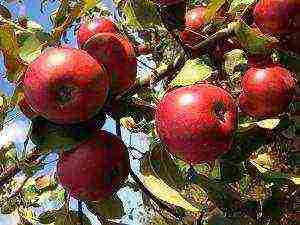 The most common type of fruit tree is the apple tree; tree varieties grow in all corners of the globe. The fruits are known for their beneficial properties to everyone, from early childhood to old age, doctors recommend eating two medium fruits a day.
The most common type of fruit tree is the apple tree; tree varieties grow in all corners of the globe. The fruits are known for their beneficial properties to everyone, from early childhood to old age, doctors recommend eating two medium fruits a day.
With such prevention, a person will never have anemia, the gastrointestinal tract will never fail, the intestines will function perfectly, clearing away unnecessary deposits in a timely manner.
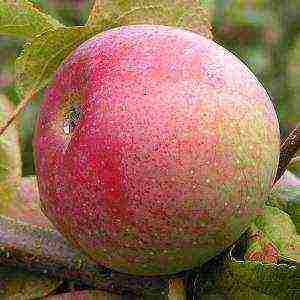 In addition, apples have a positive effect on the functioning of the heart, kidneys, pancreas and thyroid gland.
In addition, apples have a positive effect on the functioning of the heart, kidneys, pancreas and thyroid gland.
But growing an apple tree is half the battle, most gardeners plant a seedling with the hope of a big harvest.
For abundant and regular fruiting, take into account not only the characteristics of the variety, but also the climatic conditions that are most acceptable to him.
Consider in the article below the Belarusian varieties of apple trees, their detailed descriptions and photos.
General characteristics
The Belarusian land has always been famous for its fertility, various horticultural crops are grown, and the fruiting is always excellent. Breeders of local research institutes have bred apple varieties specifically for their lands, with different ripening periods, with a wide range of tastes.
The main criteria for the grades are:
- good frost resistance;
- increased immunity to various fungal diseases, scab in particular;
- large fruit size;
- good taste of the resulting crop.
The varieties will also differ in the size of an adult tree, in order to accelerate the onset of fruiting, apple trees are grown on dwarf and columnar rootstocks.
Interesting! The crown of such a tree will be small, this will greatly simplify harvesting.
There are many varieties suitable for growing in Belarus, but there are a couple of dozen main ones that are most common in the country.
The best varieties of apple trees in Belarus
Summer
 Apple trees with different ripening periods are grown on the territory of Belarus; summer varieties of apple trees are very popular.
Apple trees with different ripening periods are grown on the territory of Belarus; summer varieties of apple trees are very popular.
Below we will consider the most studied and common varieties for Belarus.
Kovalenkovskoe
Kovalenkovskoe, bred by leading specialists of the "Institute of Fruit Growing" of the National Academy of Sciences of Belarus. The fruits of the stem have high consumer and commodity ratings.... Apples, even unripe, have a sweet taste, without any sourness, large, up to 250 g each.
The ripening period is late summer, the color of the fruits is mainly green with a pronounced rich blush over the entire surface. Consumer maturity is reached 2 weeks after removal. The stem tolerates frost and drought well.
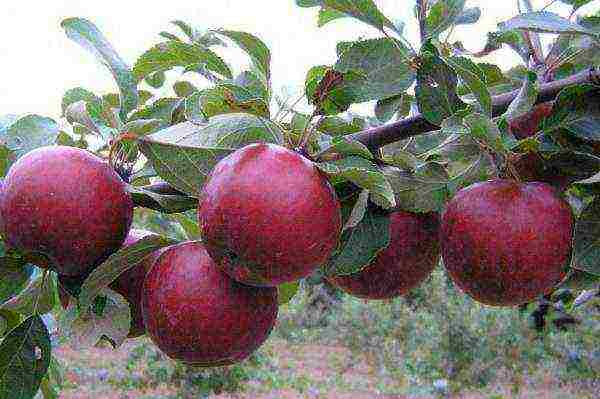
Kovalenkovskoe.
You can read more about the Kovalenkovskoye apple tree here.
Robin
Dessert fruit taste and attractive appearance serve as a calling card for the Robin. The variety has folk roots with early maturing periods. The stem perfectly tolerates the winter cold, but does not like rainy summer. Under such weather conditions, it is often exposed to scab, fruit rot.
Fruits of yellow color with a bright blush can reach 160 g. Removable and consumer maturity coincide, starting from the second half of August and until the beginning of September, apples are harvested and processed, or left for storage until October.
The variety is familiar to gardeners not only in Belarus. In the Baltic States and Finland, the apple tree feels great, pleases with good harvests.

Robin.
For more information about the Malinovka apple variety, see here.
Radiant
By crossing the Kovalenkovskoe and Bananovoe varieties, the breeders bred the Luchezarnoye apple, which was transferred for testing in 1998. The fruits of the stem have an excellent sweet and sour taste, but not long shelf life.
The tree itself is resistant to frost and scab, bears fruit annually and abundantly. Removable maturity falls in September, preferably before November.
Advice! Although the tree does not grow tall, it is best to grow on a dwarf rootstock.
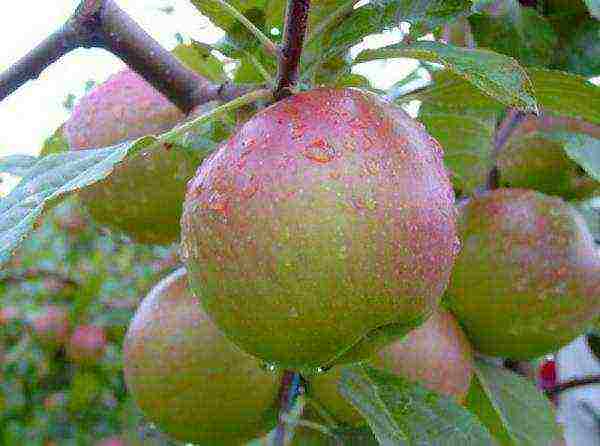
Radiant.
You can find out more information about the Radiant variety here.
Belarusian sweet
Belorussian sweet, bred by local breeders, is also referred to as late summer varieties.
Distinctive features of the trunk are high resistance to scab and other diseases, frost resistance.
Fruits are large, with juicy pulp, have a pronounced blush throughout the skin. Starting from the second year, the apple tree will regularly and abundantly bear fruit, the crop can be consumed immediately after being removed from the crown.
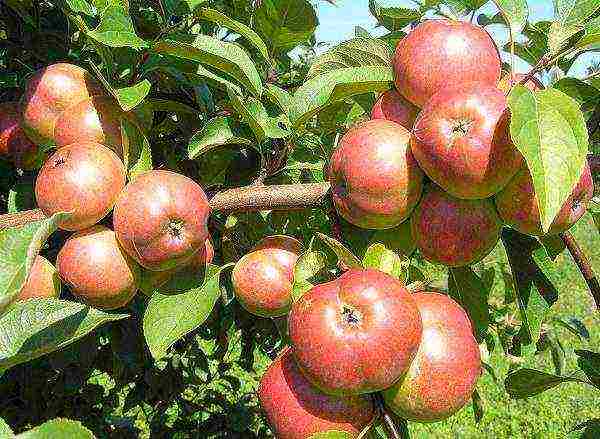
Belarusian sweet.
You will learn more about the Belarusian sweet apple variety from this article.
Minsk
Since 1967, the Minskoye apple-tree bred by A.E.Syubarov has been included in the State Register of Belarus. The stem has an average crown height, bears fruit annually and abundantly. The fruits are green with yellow color, large, juicy. Sweet and sour taste was rated at 4 points on the generally accepted world scale.
Apples harvested as much as possible in September lie until early December.

Minsk.
Elena
Early varieties of apple trees are also supplemented by Elena's apple, which it has excellent taste. The sweetness of the tender pulp, combined with the sourness, yielded 4.8 points in the assessment. The fruit is unusually fragrant, ripens in August, but does not lie.
Myself low stem, with a rounded crown. Characterized resistant to scab and frost... Bears fruit regularly and abundantly.
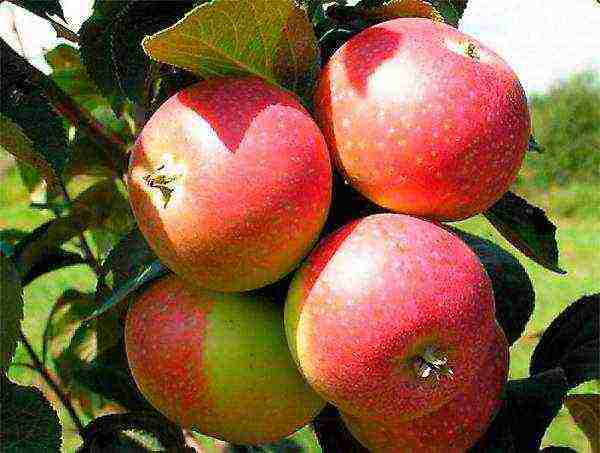
Elena.
For more information about the Elena apple variety, see here.
Champion
In mid-September, the Champion is harvested. The variety was bred in the Czech Republic, has a high resistance to fungal diseases, perfectly tolerates winter frosts up to 40 degrees. A distinctive feature is excellent transportability and great taste.
Fruits of a greenish color with a blurred dull blush of a large size are known all over Europe.
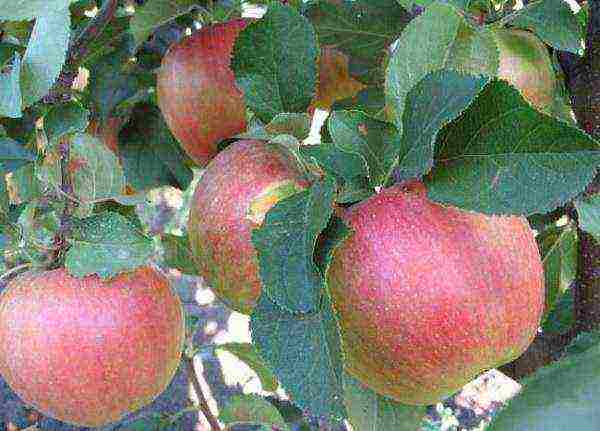
Champion.
You can find more information about the Champion variety here.
Spartan
At the end of the first month of autumn, Spartan apples are poured together. The variety was bred back in 1926 and is still quite popular. The fruits are of medium size, colored yellow with an abundant blush. Sweet taste without sourness at all.
A feature is high resistance to all fungal diseases, abundant fruiting, unpretentious care.
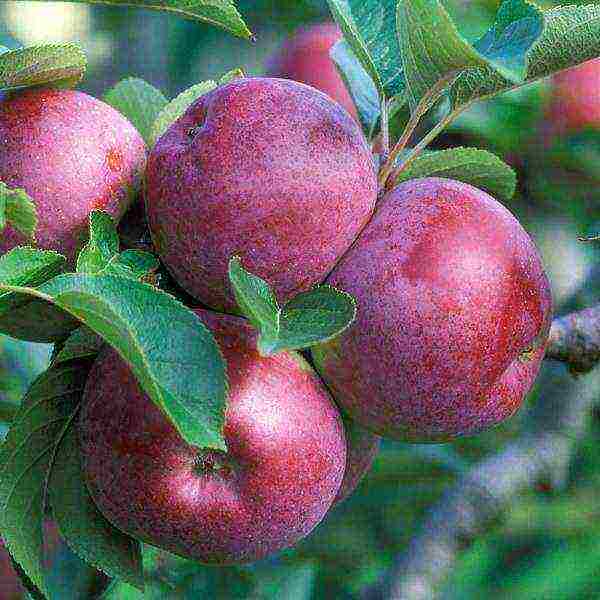
Spartan.
You will learn more about the Spartan apple variety in this article.
Geneva
The American Geneva, bred in the 60s of the last century, also took root well on the Belarusian lands. The variety has excellent fruiting performance, apples are large, sweet and sour, attractive appearance.
The stem grows medium in size, up to 5 m in height. Resistance to frost and disease is not high, at minus 20 the buds of the apple tree are severely damaged. With the help of fungicides, the tree can be protected from scab and other fungi.
Ripened in july apples are practically not stored, they are consumed fresh and processed.
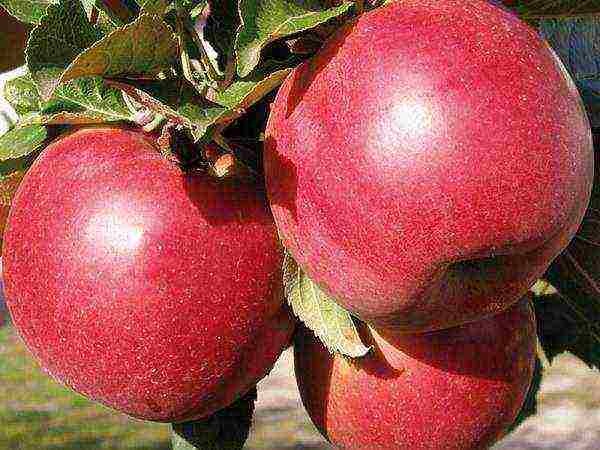
Geneva.
Winter
For those who like to savor an apple during the cold season, winter varieties are more suitable.
Honey Crisp
Honey Crisp or honey crunch will appeal to many. The stem was bred by gardeners in the United States, but it is widespread throughout Europe.
The fruits of the tree have a rounded, slightly elongated appearance. The skin is yellow, with a blush. The taste is sweet, in the northern regions of cultivation, a slight sourness is allowed. The pulp is very crunchy when biting off, from this feature the name comes from.
The harvest is harvested in late September, early October, but the apples should reach. Consumer maturity does not come until November, but they can lie until May.
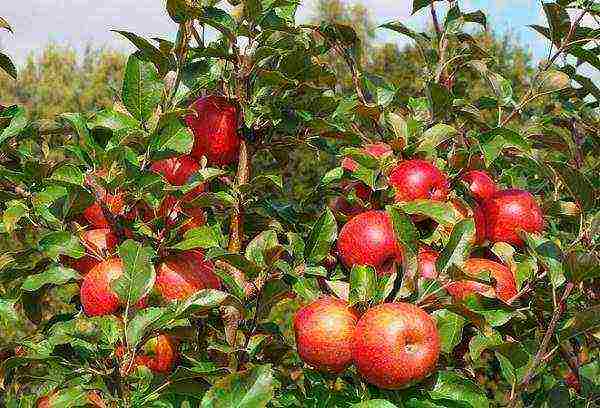
Honey Crisp.
For more information about the Honey Crisp apple variety, see here.
Navavita
Apple varieties of Belarusian selection offer us the Navavit apple tree. Her apple lies perfectly until Marchoften used for juice processing. Fruiting begins in the third year after planting, abundant. The apples are flat, greenish with minimal blush, the taste is sweet and sour.
The tree itself has a spreading crown with many branches.
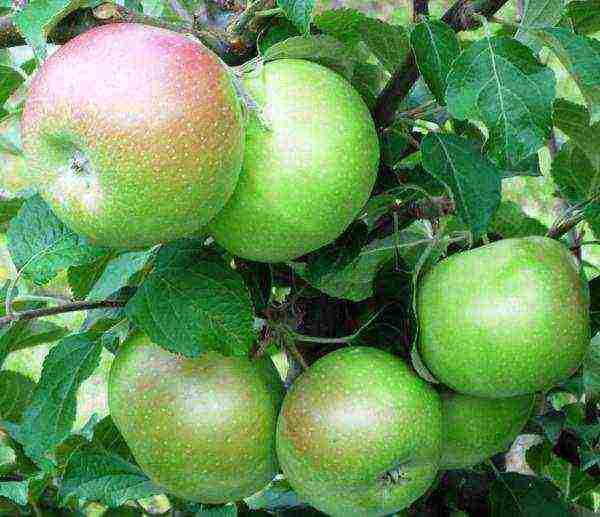
Navavita.
Belana
Belana belongs to winter-hardy varieties with a long shelf life. The fruits have a wonderful sweet taste, which is the best complement to the sourness. Shelf life after removal is long, until April.
The stem itself has a stable immunity to scab and other fungi, but preventive treatment in the spring will not hurt. It is also not afraid of frost, it tolerates them perfectly.
The crown is branched, spreading out, and requires annual pruning even in adulthood.
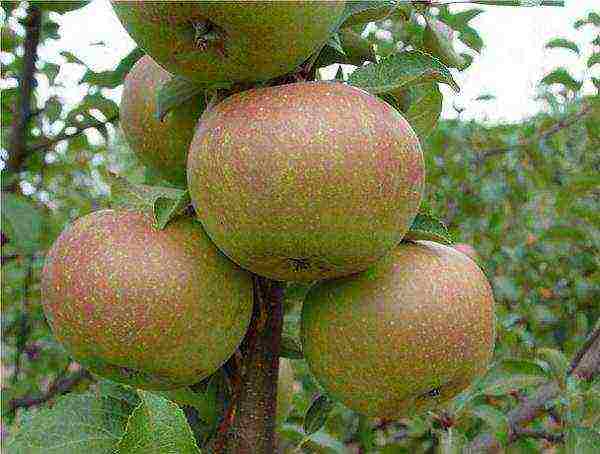
Belana.
Antaeus
Antey is distinguished by a high yield among late winter varieties. His fruits lie perfectly until Maywhile maintaining great taste. Apples have a beautiful red and burgundy color that attracts the attention of buyers.
The stem bears fruit annually and abundantlytherefore it is often used for cultivation on farmland.
Important! Agricultural technology and unpretentiousness contribute to the growing popularity of the winter-hardy variety among horticultural farms.

Antaeus.
You can read more about the Antey apple tree here.
Auxis
Lithuanian bole Auxis successfully grows and bears fruit in the Belarusian lands. Its fruits are of medium size, are distinguished by high keeping rates, subject to the necessary conditions. The pulp is juicy, fragrant, with a spicy aftertaste. Sweetness perfectly complements the sourness, their tandem perfectly refreshes. The color of apples is yellowish-green with a blush over the entire surface.
The tree grows to a medium size, has a compact crown. Frosts up to minus 20 are not terrible for him, stronger ones are capable of causing harm. Scab and other fungi can periodically attack the bole; it should be protected by applying fungicides.
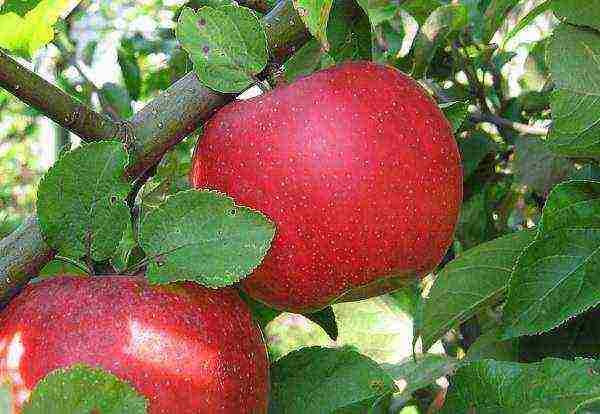
Auxis.
For more information about the Auxis apple variety, see here.
Lobo
The Canadian cultivar Lobo was recently discovered by Belarusian gardeners. The stem differs sufficient frost resistance, high palatability of fruits, long-term storage of the crop.
The disadvantages include periodic infection with fungal diseases, but, if the climate is not humid, the tree practically does not get sick.
Large fruits have a good presentation.
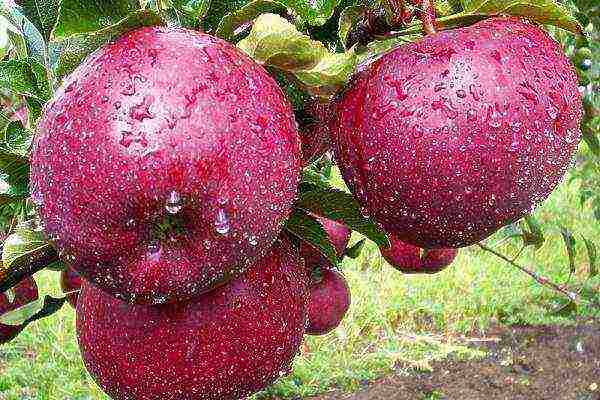
Lobo.
Find out more about the Lobo variety here.
Zaslavskoe
The apple variety Zaslavskoye has been included in the register since 2002, but has rapidly spread among gardeners. Late winter bole is distinguished by high immunity to scab, frost resistance.
Fruits are sweet with sourness, aromatic, perfectly stored until May.
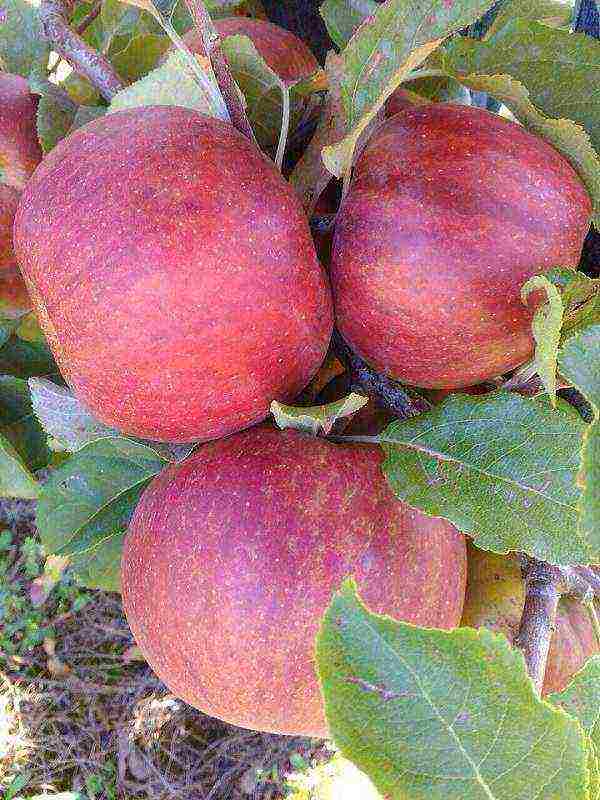
Zaslavskoe.
You will learn more about the Zaslavskoe apple variety from this article.
Kochtel
Koshtela is the most widespread variety in the Gomel and Brest regions. It is characterized by an excellent taste of apples, which will last until March.
Resistance to frost and scab allows growing boles in other parts of the country and abroad.
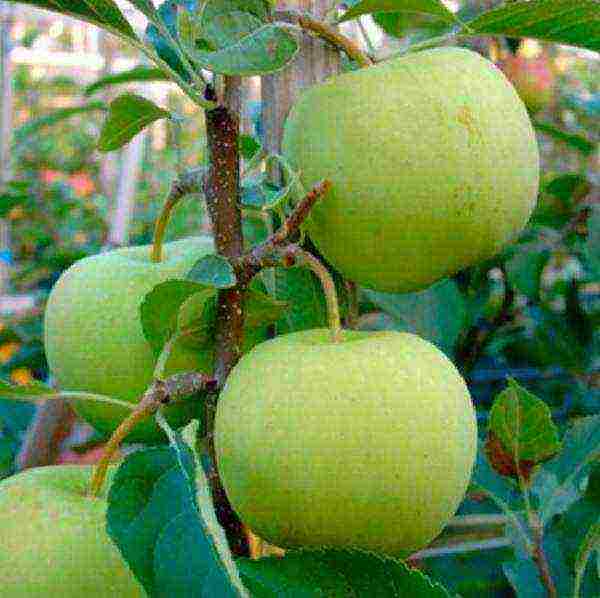
Kochtel.
Idared
Idared is grown not only in private gardens, but also on an industrial scale. Excellent keeping quality and transportability of the crop contributes to this.
The stem is classified as medium-sized, regularly fruiting. The fruits are large, with excellent taste, they are consumed fresh and processed.
The winter varieties of Syabryna and Pospeh also have similar characteristics.
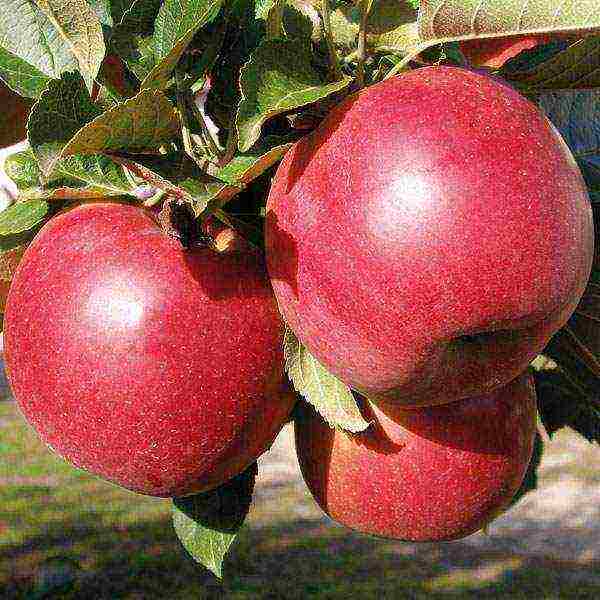
Idared.
For more information about the apple variety Idared, see here.
Dwarf, undersized and columnar stems
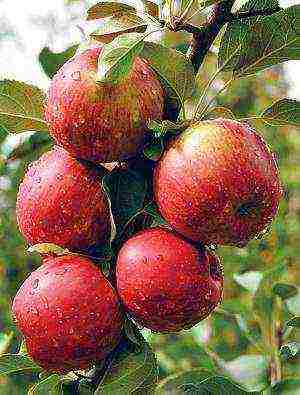 In order to save space on the site and plant more different varieties, gardeners increasingly prefer compact apple trees.
In order to save space on the site and plant more different varieties, gardeners increasingly prefer compact apple trees.
On a dwarf rootstock, you can grow:
- Idared;
- Geneva;
- Champion.
Columnar is best done:
- Robin;
- Kovalenkovskoe;
- Radiant.
They differ in stunting:
- Lobo;
- Belarusian sweet;
- Honey Crisp.
Varieties rating
In order for the garden you planted to develop and regularly bear fruit you need to carefully consider the choice of varieties. Pay special attention to:
- for pollinating varieties that will grow in the neighborhood. To do this, select similar stems with the same or different ripening periods;
Advice! "Raika" will be a universal pollinator for any apple tree.
- the soil in which the seedlings will be planted will also be important. Each variety has its own characteristics and preferences for soils, it should be taken into account without fail;
- fertilization and feeding of plants should be carried out regularly;
- remember to trim and trim the crown.
These are universal tips for all boles, but for the lands of Belarus, it is worth choosing seedlings for planting:
- with good indicators of frost resistance, because often the thermometer shows low temperatures, which can simply destroy the laid flower beds;
- have immunity to scab and other fungal diseases that can negate your efforts to care;
- regular yield is desirable, then the gardener will be with fruits annually;
- choose varieties on a dwarf or columnar rootstock, this will significantly speed up the time of fruiting;
- Drought resistance is also important, because it is not always possible to water trees in hot weather.

Seedlings of apple trees with a closed root system.
These characteristics are inherent in many varieties of both domestic and foreign selection, which perfectly take root and bear fruit.
One has only to study in more detail the features of a particular variety and take care of the seedling with full responsibility.
By sweetness
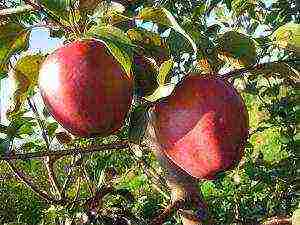 You can also choose seedlings according to your individual taste preferences. Lovers of sweet apples will love:
You can also choose seedlings according to your individual taste preferences. Lovers of sweet apples will love:
- Kovalenkovskoe;
- Belarusian sweet;
- Spartan;
- Honey Crisp.
Scab resistance
Abundant fruiting also depends on the immunity of the tree, the higher it is in relation to scab and other fungi, the greater the yields. These diseases are not terrible:
- Radiant;
- Belarusian sweet;
- Minsky;
- Elena;
- Champion;
- Spartan;
- Belane;
- Zaslavsky;
- Kostele.
Apple scab.
By maturity
Autumn
 The period of fruit ripening will also be important, at the beginning of autumn you can use:
The period of fruit ripening will also be important, at the beginning of autumn you can use:
- Melba;
- Elena;
- Radiant;
- Kovalenkovskoe;
- Robin;
- Geneva;
- Belarusian sweet.
Winter
During the cold season, apples will help remind you of summer:
- Honey Crisp;
- Navavita;
- Belana;
- Antaeus;
- Auxis;
- Lobo;
- Zaslavskoe.
Useful videos
Watch a video about winter varieties of apple trees:
Watch a video about autumn varieties of apple trees:
Watch a video describing the summer varieties of apple trees:
Watch a video on how to properly care for seedlings:
Conclusion
The apple orchard is pleasing to the eye both at the time of flowering and during the period of fruit ripening. Proper care will lead to high yields, which, depending on the variety, can be stored for quite a long time.
Apple trees occupy 95% of the area of all fruit plantations in Belarus, not only the best varieties from all over the world are grown, medium-sized, tall, dwarf, columnar apple trees, but, most importantly, varieties of Belarusian selection.
Features of Belarusian breeding
In Belarus, even in Soviet times, a large selection work was carried out, which does not stop to this day, Belarusian varieties are known to gardeners from different countries. Of the new ones, I would like to name such early or summer varieties: Kovalenkovskoe, Orlovim, Dream. They ripen in July and can only be stored for one month. Well known to professionals are such autumn varieties, zoned for the Vitebsk region: Luchezarnoe, Orlik, Auxis.
Autumn apples are good because they ripen at the beginning of autumn, they can be eaten for up to three months without losing the quality of the fruit. But winter varieties are considered the real elite of apple culture; they give a harvest in early autumn, store it for about five months. The latest technical ripeness comes in October, and they are recommended to eat in a couple of months, when the sweetness and aroma intensify, they can be stored until the next harvest.
Among them, columnar apple trees occupy an important place, and from the local ones, Alesya, Freedom, Pamyat Kovalenko, Verbnoe, Pospekh, Zaslavskoe, Antey, Belorusskoe Raspberry received excellent reviews. The varieties of their apple trees are well known in Belarus, for many of them the Golden Delicious apple tree served as a selection material. Before deciding which apple trees to plant in your garden, you should look at the reviews, read the description and the main characteristics of the varieties, including columnar apple trees.
Belarusian sweet
The tree is medium-sized, the crown has a rounded-conical shape. Fruiting begins 2-3 years after planting in a permanent place of growth, the harvest is given every year. The tree perfectly tolerates cold winters, does not get sick with scab and other diseases traditional for this fruit crop.
Round fruits are covered with a dense, smooth skin, their weight varies between 135 and 200 g, the main color is green, almost all of the fruit is covered with a bright blush. They look very appetizing, delight with a weak aroma, pulp, white and tender, has a pleasant taste due to the large amount of sugars and ascorbic acid. After ripening, the fruits remain on the branches, but if they are harvested late, then they will lie less, they are consumed immediately after harvesting.
Verbnoe
The tree is characterized as medium-sized, it is valued for its indifference to frost and scab, for rich harvests. Its crown has the shape of an inverted pyramid, the branches are quite compact. The first crop can be removed within a couple of years after planting on the site.
Apples grow unevenly - from 150 to 300 g, their dense green skin is covered with a brown-red blush. The fruit is flat-round, greenish on the inside, and so juicy that it bites with a crunch. Fruits, sweet and sour with a weak aroma, lie until May, they are perfectly transported.
Darunak
The tree grows medium-sized, like most apple trees, its crown is rounded, branches drooping. The Darunak variety is appreciated for a good harvest, early maturity, the ability not to suffer from scab, to survive frosty winters without losses. Its fruits are round, there are ribs, but they are rather weakly expressed, the apples are very large - their weight varies from 180 to 350 g. Apples with a strong green skin are almost completely covered with a bluish-red blush by the time of harvest. Inside the apples are tender, greenish, aromatic, with a sour-sweet taste.
The fruits are removed after September 15, it is advisable to consume them not earlier than November, when they become sweeter and more aromatic, they are perfectly preserved until the spring of next year.
Elena
Elena is a summer variety, so apples ripen much earlier than all those described. The apple tree does not get sick with scab, tolerates winters well, gives a rich harvest. The tree is also medium-sized, the crown is oval, somewhat raised.
The apples are flat-round in shape, green in color, covered with a bright red-pink blush, their average weight is kept at 120 g. They belong to dessert, have a high tasting rating. The pulp is very tender, unusually juicy, sour-sweet. These delicious aromatic apples are stored, unfortunately, no more than a month.
Imant
Medium-sized apple trees of this variety are not afraid of severe frosts, cold winds and scab. They have a compact, rounded crown and excellent characteristics in terms of yield and early maturity. Apples are slightly ribbed conical in shape, when ripe, they are completely covered with a purple-red blush. The dense, creamy flesh is juicy to crunchy, sweet and sour. Harvested in October, and they begin to use it not earlier than December, by this time the sweetness and aroma will increase, it will be stored until next summer.
Armor
The tree does not grow very tall, unlike most late winter varieties. Its crown gradually acquires a rounded pyramidal shape, drooping branches, growing, lean towards the ground. The Pospeh variety is distinguished by indifference to frost and scab, high productivity, and early maturity.
Round fruits grow from 140 to 240 g, their main color is green, but almost the entire apple is gradually covered with a blurry-striped red blush. The skin of the fruit is dense, elastic, the flesh is greenish, fine-grained, juicy, sweet and sour. Technical ripeness begins by mid-October, but December is considered the time of consumer maturity, after lying down for a couple of months, apples become sweeter and more aromatic. They are perfectly transported, stored until April - May next year.
Syabryna
The Syabryn variety belongs to the winter. The tree is medium-tall, frost-resistant, does not get sick with scab, it is not afraid of unfavorable factors indifferently to spring frosts. On a clonal rootstock, fruiting begins as early as 3 years after planting, it is stable, regular, no periodicity of the harvest under normal conditions is observed. The crown has a round shape, straight branches are directed upwards, are compactly located, apples do not crumble when ripe.
The fruits are almost one-dimensional with an average weight of 130 g, the pale yellow color of the apple is gradually covered with a raspberry blush almost on the entire surface.The pulp is greenish, fine-grained and juicy with a sour-sweet taste, but rough, the skin is quite dense, which helps to preserve the fruits until the end of winter without losing quality. The variety is prone to a large harvest, it is advised to adjust the number of ovaries manually so that the fruits do not turn out to be small.
Video "Review of winter varieties of apple trees"
In this video, you will learn about the varieties of winter varieties of apple trees.
